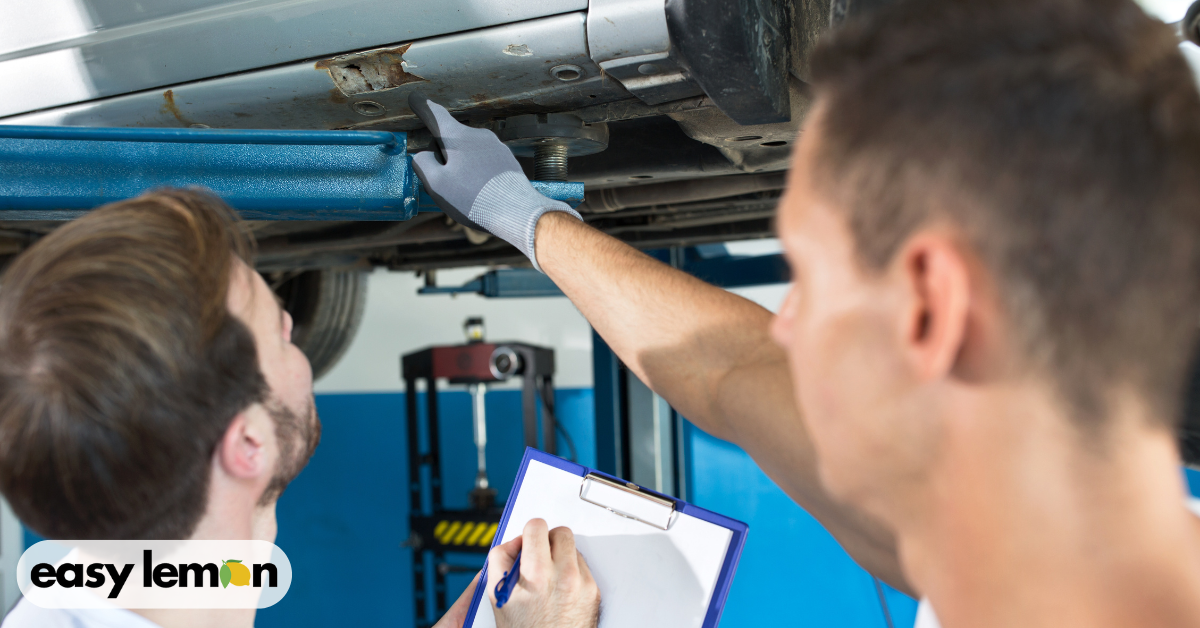General Motors’ infamous faulty ignition system caused 153 deaths , a figure many believe exceeded 866. This wasn’t the first time factory defects in new motor vehicles have killed people, and certainly won’t be the last. So, having a recurring problem in your car after several repair attempts is a cause for concern and sufficient reason to seek legal relief against the manufacturer.
In New Jersey, this type of issue is handled under the New Jersey Lemon Law. The law empowers defective vehicle owners to demand refunds, vehicle replacement, or cash settlement for their troubles. As expected, manufacturers are not always willing to part with their money. That’s why you need an experienced lemon law attorney who will make them pay for their actions and negligence.
Easy Lemon is a renowned law firm that offers Lemon law attorney services for victims of defective motor vehicles in New Jersey and beyond. We have an impressive record of 99% win rates in all lemon cases we’ve handled and have helped motor vehicle owners recover millions in compensation. Our team of New Jersey lemon law attorneys is eager to analyze your case and help you get the relief you deserve. Delay can be fatal; act now by booking a free case evaluation!
This article explains the basic requirements for a lemon law claim in New Jersey, the nature of compensation customers are entitled to under the state law, and what to do if you believe you might have purchased a lemon vehicle manufactured in NJ.
What Is the Lemon Law in New Jersey?

The New Jersey Lemon Law is a state consumer protection law that allows consumers to seek relief from a manufacturer when they purchase new or used vehicles with significant defects or problems. This law applies to passenger automobiles, motor homes (excluding their living facilities), motorcycles, and authorized emergency vehicles.
How, then, does a Lemon Law work in NJ? A new motor vehicle can be considered a “lemon” in New Jersey if the defect substantially impairs its use, value, and safety. However, the issue must occur within the first 24 months or 24,000 miles – whichever comes first – of ownership.
Also, a reasonable number of repair attempts must have been made to fix the same issue without success. The rules are quite different for used cars. But if a used vehicle meets the eligibility criteria and has a valid warranty, you may seek a full refund, vehicle replacement, or cash settlement for your troubles.
Eligibility Criteria for Lemon Law in New Jersey
To qualify for protection under New Jersey’s Lemon Law, your passenger car must meet specific requirements, which differ depending on whether it’s a new or used car. The eligibility criteria for new vehicles are as follows:
- The new vehicle must be purchased, leased, or registered in New Jersey.
- The defect must substantially impair the vehicle’s use, value, or safety.
- The defect must persist after 3 or more repair attempts. If it’s a life-threatening problem, only one repair attempt is sufficient to consider it a lemon. Alternatively, you may file for a lemon if the vehicle has been out of service for 20 or more cumulative days. Motor homes have a longer timeline of 45 days.
- An authorized dealer or manufacturer must have made all repair attempts to fix the defect.
- The repair attempts must occur within the first 24 months of the vehicle’s warranty or before it clocks an odometer range of 20,000 miles, whichever comes first.
For a Used Car Lemon Law in NJ, the rules are quite different.
- The used car must be bought from a licensed New Jersey dealer, not a private sale, for at least $3,000.
- It must have an odometer reading that is under 100,000 miles at purchase and must not be more than seven model years old.
- The car buyer must have obtained a written warranty from the licensed dealer that covers the later to-be-discovered defect part.
- Used vehicle warranties for lemon law eligibility are categorized into three based on their mileage. The best is 90 days/3,000 miles warranty if the used car already has 24,000 miles coverage or less.
Used cars with 24,000 – 60,000 coverage only get a 60-day or 2,000-mile warranty. If the car has already covered 60,000 – 100,000 miles, the customer is entitled to a warranty of 30 days or 1,000 miles.
The Lemon Law Process in New Jersey
Car owners cannot momentarily decide to file a Lemon law claim against manufacturers for a defective vehicle. Several procedures must be duly followed to ensure that your lemon law claim is attended to and you receive a favorable outcome, such as a refund, replacement vehicle, or cash compensation.
Step 1: Identify a Qualifying Defect

The first action to take if you suspect your vehicle to be a lemon is to keep track of the problem and determine if it is a life-threatening defect or a substantial issue that affects the value, use, or safety of your vehicle. These are some of the basic criteria that qualify a defective vehicle for a Lemon law claim.
Step 2: Take Proper Documentation
When vehicles develop issues, the next thing you might do as a car owner is to visit the repair shop, which is important. However, for a consumer who would like to file a Lemon Law Claim in the future, you must keep a proper record of all repairs done on your car.
Record if you’ve had three or more repair attempts for the same defect, one failed attempt for a life-threatening problem, or your vehicle has been inoperable for more than 20 days. Also, ensure that you keep every repair order given to you by the manufacturer or car dealer for each repair done. This serves as proof that you gave them a reasonable time to fix the vehicle and qualifies you to file a lemon law claim.
Step 3: Notify the Manufacturer or Dealer
Before filing a claim, New Jersey law requires you to give the manufacturer a final chance to repair the vehicle. This will also serve as a notification of your decision to consider the vehicle as a lemon upon the final failed repair attempt. Send the “last chance” notice to the manufacturer’s regional address via certified mail-return request.
The letter should contain the defects you’ve suffered, futile efforts to repair it, and the number of days it has been out of service. You should also include your contact info and vehicle identification number (VIN) so the manufacturer can confirm your warranty and defect claims.
Upon receipt, the manufacturer should reply to you within ten days, giving you a schedule for one last repair. At times, some manufacturers may ignore the letter or even deny receiving it. That’s why a certified mail-return receipt is important as proof that your message was duly communicated.
Step 4: File a Lemon Law Claim

You may proceed to file a lemon law claim if you didn’t get a response from the manufacturer after ten days, they didn’t honor the scheduled final repair attempt, or the attempt was unsuccessful.
If any of this is the case, request an application for Lemon Law Dispute Resolution from the Lemon Law Unit (LLU). Alternatively, you may consider manufacturer-approved arbitration programs. The lemon law applications to the LLU should include the documents and pieces of evidence you collated.
The unit will review these to determine whether you have a legitimate claim. After reviewing your application may be approved or rejected. In some cases, you may be requested to edit the application for clarity. If approved, you will be notified to pay a filing fee of $50, after which a copy of your application will be sent to the vehicle manufacturer.
Within a period of 20 days, a hearing date will be fixed and communicated to both parties. Since the case hearing will be presided over by the Administrative Law Judge (ALJ) of the New Jersey Office of Administrative Law (OAL), the date may be modified depending on its availability.
During this stage, it is advisable to contact a qualified lemon law attorney to increase your chances of winning. This is important because the manufacturer will also be represented by their attorneys, who obviously know what it takes to win such cases.
You don’t even have to worry about the legal fees because top lemon law firms, like Easy Lemon, will not collect any fees from you until you’ve won the case. And when you do, you can demand that the manufacturer take care of your attorney fees.
Step 5: Participate in a Hearing, Arbitration, or Lawsuit
An Administrative Law Judge (ALJ) presides over all OAL arbitration proceedings. During the hearing, you have the opportunity to present your case and give reasons why the manufacturer is culpable.
The ALJ will consider the facts of the case and deliver an initial decision within 20 days. But it’s the Director of the Division of Consumer Affairs (DCA) who will deliver the final decision at most 15 days after reviewing the ALJ’s initial decision.
So if the initial decision is not in your favor, you can file a written objection to the Director of DCA within 13 days of receiving the initial decision. The director will also consider this when drawing their final decision. If you win, you may be awarded a refund, replacement, or reimbursement.
Once more, if you disagree with the verdict reached by the DCA Director, you have a right to appeal the decision to the Appellate Division of the New Jersey Superior Court within 45 days. Failure to do so means the decision stands and cannot be changed.
You also can’t go back to start a new claim for the same vehicle through the Lemon Law Unit or Arbitration. This is why you need a lemon law attorney to help you make the right decision.
What Remedies Are Available Under New Jersey’s Lemon Law?
Under New Jersey’s Lemon Law, if your vehicle qualifies as a “lemon,” you are entitled to specific legal remedies designed to make you whole. These remedies include:
Full Refund

A full refund includes the full purchase price of the vehicle, along with associated costs such as sales tax, registration fees, finance charges, and title fees. For a leased car, the refund covers all lease payments made, the down payment, and any early termination fees.
However, the manufacturer is entitled to subtract a reasonable allowance, based on the mileage driven before the first repair attempt for the defect. The goal of the refund is to place you in the same financial position you were in before purchasing the faulty vehicle.
Vehicle Replacement
Vehicle replacement is another remedy captured under the New Jersey Lemon Law. If the decision of the arbitration hearing awards you a vehicle replacement, the manufacturer is required to replace the vehicle with a comparable new one at no additional cost to you. A comparable vehicle simply means that the replacement vehicle must be from the same manufacturer and of the same model as the original vehicle.
For example, if you purchased a 2023 Toyota Camry, the replacement vehicle would typically be a 2023 Toyota Camry or an equivalent in terms of features and options. Also, the replacement vehicle must be new, not used or pre-owned. If the exact model year isn’t in stock, you may be given the closest available option.
Cash and Keep Settlement
Cash and keep settlements are fairly common in New Jersey, particularly in situations where the manufacturer believes the defect is intermittent, the vehicle has non-safety-related issues, or the consumer prefers to continue using and owning the vehicle.
This remedy type requires the manufacturer to pay a lump sum to settle the complaint from the consumer without taking back the car. The compensation typically covers repair costs, incidental expenses (towing or rentals), and the diminished value of the vehicle.
How Long Do I Have to File a Lemon Law Claim in New Jersey?

In New Jersey, there is no specified deadline for filing a Lemon Law Claim. However, consumers are usually advised to report all defects to the manufacturer or car dealer within 24 months of purchase or 24,000 miles for a new motor vehicle. This is one of the most important eligibility criteria for a Lemon Law Claim. Additionally, once a report has been made within the aforementioned duration, you have four years to formally file a Lemon Law Relief.
For a used car, you must file the claim within a maximum of three months or 3,000 miles from the date of purchase. The exact period depends on the type of warranty you received when you purchased the vehicle. You can refer to the “Eligibility Criteria for Lemon Law in New Jersey” section of this article to learn more.
What Happens If Your Motor Vehicle Doesn’t Qualify?
Suppose your motor vehicle does not qualify as a lemon under the New Jersey Lemon Law requirements for reasons, such as not showing a substantial defect, exceeding the protection time frame and mileage limit, or it was purchased outside of NJ. In that case, you may seek redress under other grounds, like:
1. Consumer Fraud
Consumer fraud is a legal ground you can use to sue a car dealer or seller if you believe you were intentionally misled or deceived into purchasing a vehicle. In New Jersey, the Consumer Fraud Act protects buyers from such practices.
Examples of consumer fraud include rolling back the odometer, showcasing a vehicle as “certified” when it’s not, or hiding known defects. A consumer can sue the seller on such grounds and may be entitled to triple the actual damages (called treble damages), plus attorney’s fees and costs.
2. Used Car Lemon Law
For used vehicles that have exceeded the 24 months/20,000 miles window, you could file a claim under the NJ used car lemon law, provided that the car was bought from a licensed dealer. Anything outside of this window, the lemon law may no longer apply.
3. Magnuson-Moss Warranty Act
A warranty is a written guarantee from the manufacturer promising to repair or replace certain vehicle components without any extra charge as long as it falls within a designated period. Even without invoking the Lemon Law, the manufacturer is obligated to honor the tenets of the warranty it issued, whether express or implied.
In cases where the seller fails or refuses to honor this responsibility, you may file for a breach of warranty under the Magnuson-Moss Warranty Act. If successful, you can recover the purchase price, repair costs, attorney fees, and taxes paid. You may also get a replacement vehicle.
However, note that the warranty period differs for different manufacturers. For instance, brands like Hyundai, Kia, Genesis, and Mitsubishi offer extended powertrain warranties of 10 years or 100,000 miles, while luxury brands like BMW, Mercedes-Benz, and Audi often provide four years or 50,000 miles of bumper-to-bumper coverage, sometimes combining this with their powertrain warranties.
While the warranty types may differ, they typically cover major parts of the vehicle, such as the transmission system, suspension system, powertrain, cooling system, and several other internal lubricated parts.
Powertrain parts includes, but is not limited to engine block transmission mount, turbo charger housing, engine block, oil pans, engine mount, cylinder heads, and valve covers. Any of these internal lubricated parts that become defective can significantly affect the performance of the powertrain. Your powertrain warranty may also be affected by whether your vehicle is a rear wheel drive or a front wheel drive. The internal lubricated parts of the transmission system include axle shafts and their U-joints, throw out bearings, oil pump, vacuum modulator, constant velocity joints, and torque converter.
Ready to Fight for Your Lemon Law Rights in New Jersey?
It is important to understand your rights as a car owner, whether you’ve bought a new or used motor vehicle. This allows you to take the right actions against being stuck with a defective vehicle that substantially impairs its use, value, or safety.
Hence, you can demand a refund, replacement vehicle, compensation, or hold both the manufacturer and dealer accountable under the state’s Lemon Law. You’ve got one good shot at this and you have to make it count, else your manufacturer and dealer will get away with the pain and suffering they caused you.
At Easy Lemon, we believe that every car owner deserves a fair hearing to plead their case against erring vehicle manufacturers and dealers. We’ve got a team of highly experienced New Jersey lemon law attorneys who will help you plead your case and significantly increase your chances of winning a good settlement package.
And guess what? We don’t charge upfront fees. You only pay if we win the case. Contact us now to book a free case evaluation.
FAQs
Can I File a Lemon Law Claim if the Car Is Used?
Yes, you can file a Lemon Law Claim for a used motor vehicle in New Jersey, but only under the specifications outlined in the New Jersey used car lemon law, as we discussed in this article. The rules are quite different from the new car lemon law.
Can You Return a Used Car in NJ?
In NJ, you generally cannot return a used car simply because you changed your mind. Once you sign the purchase contract and take possession of the vehicle, the sale is typically final. But if you bought the car from a licensed dealer and it proves to be defective, you may request a refund under the New Jersey used car lemon law.
Do I Need to Hire a Lawyer for a Lemon Law Claim?
No, you do not need to hire a lawyer for a lemon law claim. But it’s advisable you hire one to increase your chances of winning your case.
What Happens if the Manufacturer Refuses to Replace or Refund My Vehicle?
If the manufacturer refuses to replace or refund your vehicle after you’ve won your Lemon Law claim in New Jersey, there are several other legal actions to take, such as filing a complaint with the NJ Lemon Law Unit or filing a lawsuit in court.
What Happens After a Car Is Ruled a Lemon?
After you’ve received your due compensation in keeping with the arbitration’s final decision, the vehicle must be taken to the New Jersey Motor Vehicle Commission for the title to be branded as a lemon. That way, anyone who eventually buys it will not be ushered into surprise issues.
What Is Considered a Substantial Defect?
A substantial defect in the Lemon Law is any problem that negatively affects the value and safe usage of a vehicle. This simply means a malfunction in any of the covered items under the car’s warranty. Some of the covered items include timing belts, harmonic balancers, propeller shafts, hub bearings, axle shafts, and water pumps. Others include internal lubricated parts of the powertrain, such as the clutch master, manual clutch, pressure plate, and slave cylinders.


